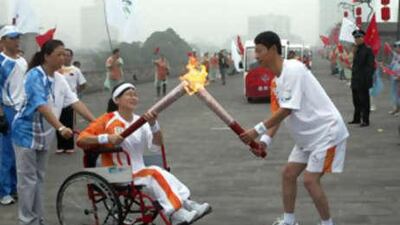If the good people of Beijing have been suffering from ODS (Olympic Deprivation Syndrome) since the extinguishing of the flame, allow me to reassure them that the carnival is about to start all over again this coming Saturday. The Paralympians are coming to town and, as one privileged to witness their athletic prowess and share their boisterous company in Sydney and Athens, I have no hesitation in promising that this will be an experience like no other.
I say this with one proviso - that the citizens of China support the Games with the same unbounded enthusiasm displayed by the Aussies who set a new trend in 2000 by treating the Olympics and Paralympics as two indistinguishable parts of the same continuous festival of sport. The Paralympics have now become one of the biggest sports events on Earth, due in no small part to the emergence of a host of global superstars; athletes such as Oscar Pistorius, the fastest man in the world on no legs over 100, 200 and 400 metres, and his countrywoman Natalie du Toit, who won five swimming gold medals in Athens four years ago before making history by becoming the first Paralympian to compete in the Olympics when she swam in the 10km open-water marathon event in Beijing.
It was not always thus; at the inaugural Paralympics in Rome in 1960, local hospital nurses acted as referees, doctors handed out the medals (awarded to each and every competitor lest anyone should be made feel like a loser), hoopla was one of the featured sports and the athletes received a special blessing from Pope John XXXIII at the Vatican. China, incidentally, was among a number of countries that did not send a team for the simple reason, so they said, that its massive population did not include any disabled citizens. Forty-eight summers on, Bin Hou, the single amputee 'Leg-End' from Shanghai who would have won every Olympic high-jump gold medal from 1896-1908, will light the Paralympic flame at the climax of what is certain to be another extravagantly choreographed opening ceremony in Beijing.
"Everyone got a medal in Rome, did they? Lovely," says Britain's multiple wheelchair racing Paralympic champion Dame Tanni Grey-Thompson, her voice laden with sarcasm. "The organisers were probably acting with the best of intentions but I hate that 'Oh, bless' attitude. Even in Seoul in '86, it was all a bit patronising, pat-on-the-head stuff. That's why Sydney 2000 will always hold a special place in the hearts of everyone who was there. The Aussies love their sport and they treated us simply as sportsmen and women. We weren't regarded as role models or inspirations, we were competitors. Some of us won gold medals, most didn't, but, hey, that's life. Sydney was phenomenal because, from day one, you felt there was something extraordinarily special in the air. Sydney was an athletic Disneyland, it was where magic happened. It probably marked the time and place when Paralympians genuinely became part of the Olympic Movement. And I'm delighted to say Athens three years ago wasn't far behind. I still can't believe they built a lift - a pretty scary and rickety one, it has to be said, but they did it - up the rock face of the Acropolis so the wheelchair athletes could visit the Parthenon."
The Paralympic Flag comprises three Tae-Geuks (a Korean decorative motif representing mind, body and spirit) in red, green and blue; some see them as tears, but if they are, then they are invariably tears of laughter for these are elite athletes blessed not with super-egos but a truly wicked sense of humour. The late Graham Salmon, the original superstar of British blind athletics, delighted in recalling his first appearance at the Multi-Disabled World Championships at Stoke Mandeville with a chuckle: "The 100 metres was run on concrete, which was bad enough. But if you're desperately trying to listen for the voice of the caller who's guiding you when, over the Tannoy, another strange voice booms out, `Will the competitors in the paraplegic table-tennis tournament please report to the main sports hall', I don't need to tell you what happens.
``The 100 metres runners suddenly went hurtling all over the place. Two had to be rescued from the steeplechase water-jump, another shot off the track and disappeared down the tunnel, and I seem to recall one poor fellow found himself live target practice for the javelin throwers." Then Graham's tone would turn to one of genuine sadness: "No spectators, no organisation, and no comprehension that we regarded ourselves as athletes who happened to be disabled, not disabled athletes."
In their hearts and minds, that is the message the 4,200 competitors from 67 nations will carry with them to Beijing: "Regard us as athletes who are disabled - not disabled athletes." And therein lies a world of difference... sports@thenational.ae

